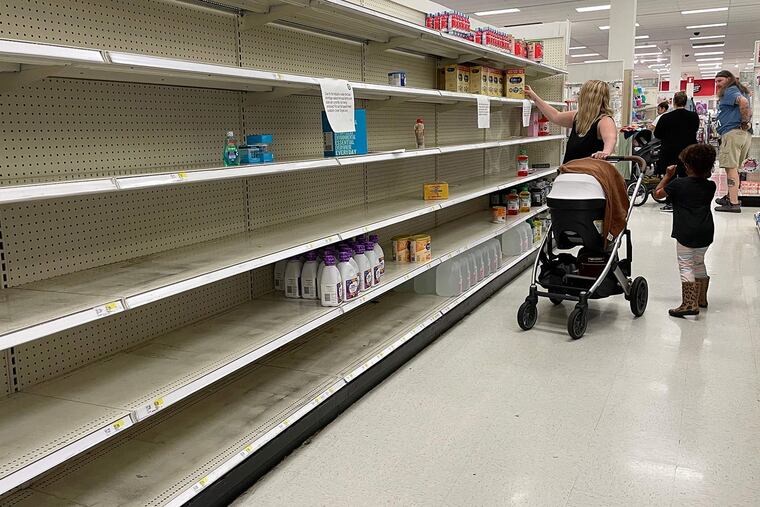A planeload of baby formula from Australia is coming to Philly as U.S. shortage persists. Bubs could arrive at Acme stores this weekend.
Months into the infant formula crisis, the Biden administration is trying to make it easier for imported products to reach store shelves.

Months into the baby formula crisis, the Biden administration is scouring the globe and trying to make it easier for imported products to reach U.S. consumers as supermarket and big box store shelves still lack infant formula.
The Philadelphia area is set to get a shipment from an Australian formula maker that won expedited approvals from federal regulators.
UPS is jetting a planeload of Australian formula — the equivalent of two million baby bottles — to Philadelphia on Tuesday to ease a persistent shortage caused by a Michigan plant shutdown and a pandemic-weakened supply chain.
Kristy Carr, the top executive at the manufacturer, Bubs Australia, said in an interview that the infant formula is being distributed regionally and nationally through Walmart, Target, Albertsons, which owns the local Acme supermarkets, and Kroger. Several shipments landed in other parts of the U.S. in June to be distributed throughout those retail chains — and some could be in Philly this weekend.
An Acme supermarkets spokesperson said Thursday that “we will be carrying Bubs formula and expect our Philly Acme stores to receive their first shipment this weekend. We cannot comment on general availability of inventory.”
Walmart and Target did not respond to requests for comment.
UPS spokesperson Jim Mayer said the package-delivery giant is “glad to have the opportunity to be of service during the crisis” with the Australia-to-Philadelphia flight. “There are few companies with the ability to move such a huge shipment 10,000 miles with door-to-door delivery.”
The Food and Drug Administration approved Bubs in May to import more than 25 million 8-ounce baby bottle equivalents of infant formula into the United States, and shipments began arriving June 12. The Philadelphia planeload will be Bubs’ fourth to the U.S., after two deliveries to Los Angeles and another to Columbus, Ohio.
» READ MORE: These Philadelphia-area parents are helping each other find infant formula during the shortage
Because Australia has a food-regulatory system similar to the United States, the FDA expedited the company’s application to import formula, Carr said.
Under normal circumstances, it would have taken three years for the regulatory approvals to import Bubs, Carr said. Because of the crisis, the FDA approved its application in 10 days.
“I don’t think that families or babies will have any trouble switching to Bubs or other imported formula,” she said.
A 17-year-old company with a plant in Victoria, Bubs Australia has been selling toddler formula in the United States for about a year. The manufacturer began with toddler formula because it was easier to obtain the FDA approvals, Carr said.
In the new shipments, Bubs is importing both standard and specialty infant formulas, including a goat milk-based formula. The Bubs “tins” are larger than U.S. infant formula products. But Carr said that on a “cost-per-ounce” basis the Aussie Bubs product will be similarly priced to U.S. infant formula.
An alarming shortage
The infant formula crisis, which has been frightening for many parents, began with spotty shortages during the pandemic and worsened in February when Abbott Laboratories recalled powdered infant formula products, including the popular Similac brand, and halted production at a big formula-manufacturing plant in Sturgis, Mich., after bacteria was found at the site.
Four companies control 90% of the U.S. market for infant formula: Abbott, Gerber, Mead Johnson, and Perrigo Nutritionals. Perrigo produces store-brand infant formulas for major stores including Walmart, Target, Kroger, CVS, Walgreens, and Sam’s Club.
During the first week of May, the average out-of-stock rate for baby formula at retailers across the country was 43%, according to data from the firm Datasembly, which collected information from more than 11,000 sellers. “This issue has been compounded by supply chain challenges, product recalls, and historic inflation,” Datasembly CEO Ben Reich said in a May 10 statement.
To restock the nation’s store shelves, the Biden administration opened the U.S. market to FDA-approved imports and Biden invoked the Defense Production Act to direct critical ingredients to baby formula manufacturers ahead of companies with other manufacturing needs. The Biden administration’s Operation Fly Formula also began facilitating flights for imports.
‘We need sustainable solutions’
Meanwhile, domestic infant formula production remains glitchy.
Abbott restarted production at the Michigan plant in early June. However, the company shut down production less than two weeks later when severe thunderstorms caused flooding. Abbott said the plant could be down for several weeks for sanitizing.
In a statement on June 15, Abbott said the latest shutdown would “likely delay production and distribution of new product for a few weeks.”
Ron Belldegrun is the cofounder and chief executive officer of ByHeart, an infant formula plant that began production in March in Reading after years of development, a clinical trial, and FDA approvals.
“We need sustainable solutions,” Belldegrun said Thursday. “We need to make sure that as a country we’re never again in a situation where one company has a recall and 50% of the nation doesn’t have formula.”
Belldegrun believes that the “only sustainable solution is to invest in domestic production so we don’t have such a fragile supply chain.”